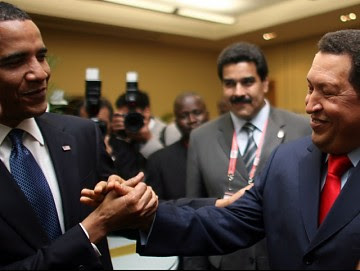Apparently Obama and Chávez approached one another, and this happened:

Whether or not this will translate into a thaw in US-Venezuelan affective relations, of course, remains to be seen.
The ties of oil have always lurked just beneath the war of words between Bush and Chávez of the last 8 years. According to the Council on Foreign Relations, "Venezuela supplies about 1.5 million barrels of crude oil and refined petroleum products to the U.S. market every day, according to the EIA. Venezuelan oil comprises about 11 percent of U.S. crude oil imports, which amounts to 60 percent of Venezuela’s total exports. PDVSA also wholly owns five refineries in the United States and partly owns four refineries, either through partnerships with U.S. companies or through PDVSA’s U.S. subsidiary, CITGO." The possibility of a US military intervention aimed at ensuring the flow of oil (especially during the nadir of the Iraq occupation and resistance for the empire) has always been a source of anxiety for Bolivarian policymakers and activists alike.
In the lead up to the conference, Chávez and several other Latin American leaders argued that the true test of the Obama administration vis-a-vis its standing among them would be how quickly it moved to end its blockade of Cuba. Apparently, this is also in the offing -- though the extent to this normalization (and whether or not it will be tied to new, less overt and militaristic attempts to take down the Cuban Revolution) has yet to be put into any sort of detail.
Indeed, this question of 'what is to come' in the event of normalization has long been an issue of concern with Cubans. While the island is most certainly divided on the question, legacy and future of the revolution (and what society isn't, revolutionary or no?), there is something of a consensus against the transfer of social power to a repatriated Cuban exile community in Miami.
All this aside, I remain a bit shocked. Both Obama and Chávez are master political craftsmen, but this first series of gestures was by no means inevitable (recall Obama's Venezuela-baiting during the presidential debates). The biggest danger here is that a cooling down of the rhetorical clash between Washington and Caracas might translate into a further consolidation of the power of conservatives in the Bolivarian movement, especially in this time of economic crisis.
Obama is of course doing a lot of repair work here. Eight years of Bush not only alienated most of Latin America from the US in terms of foreign policy (through arrogance, belligerence and outright negligence as the whole of Washington became obsessed with its 'war on terror') it also allowed for China to make significant inroads in the region. Just in the past few months, China has signed several joint development agreements with countries in the region. Russia too has signed military agreements with Venezuela and Bolivia, in no small part spurred on by the recommissioning of the US fourth fleet in the Caribbean and its increased use of Curaçao (only a few miles off the coast of Venezuela).
In this geostrategic and economic light, Obama's gesture today should be seen less as some sort of beneficent act and more one of desperation. The US's major allies in the region (Mexico, Colombia, Peru) are in the grips of civil wars, economic collapse, and serious deficiencies in terms of democratic legitimacy. The rest of the region is (to vastly varying degrees, to be sure) is pursuing a pluripolar world, building South-South ties rather than begging for bigger crumbs at the WTO. Brazil is emerging as a new regional superpower, filling the void left by the US in the past 8 years. Chávez continues to enjoy massive popular support at home and abroad (as far abroad as Palestine.
In other words, Obama should be seen as a savior here only insofar as he is trying to slow down the accelerating slide of US hegemony.
BUT THEN AGAIN: Chávez also reiterated that these sorts of international events, and the US-founded groupings which spawn them, are ultimately oriented towards 'free trade' and the continuation of US economic dominance in the region and the world. ALBA (The Bolivarian Alternative for the Americas) has been holding concurrent meetings in Venezuela while the OAS sponsored Summit of the Americas was held in Trinidad. Cuba is a member of ALBA, it has not been a member of the OAS since 1962.
In this regard, and vis-a-vis the most recent Summit in Port of Spain, Chávez emphasized that the choice of governments like Venezuela, Bolivia and Cuba to resist OAS 'declarations,' which continue to ostracize Cuba and continue to push for the longevity and extension of US-dominated 'free trade' agreements, is a 'sovereign' one. Perhaps the most important thing to watch for in the days following the summit will be the extent to which the Obama administration accepts this right of sovereign states. We know it doesn't want to, the question is whether it thinks it still can.

No comments:
Post a Comment